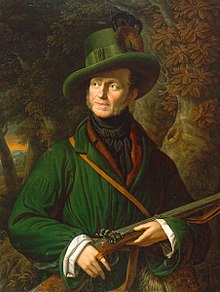|
Duke Gustav Wilhelm of Mecklenburg-Schwerin
Duke Gustav Wilhelm of Mecklenburg-Schwerin (31 January 1781 – 10 January 1851) was a member of the German grand ducal house of Mecklenburg-Schwerin. Military careerGustav Wilhelm was born in Ludwigslust on 31 January 1781, the second surviving son of Frederick Francis, Hereditary Prince of Mecklenburg-Schwerin, later Grand Duke, and Princess Louise of Saxe-Gotha-Altenburg. In 1807, the ducal family went into exile in Altona during the Napoleonic Wars. Gustav Wilhelm served as a ryttmästare in the Swedish Army and a major in the Prussian Army. He was on his Grand Tour in Naples in 1813 when the German campaign of 1813 broke out and subsequently returned to Ludwigslust to take up the rank of major in the Mecklenburger volunteer regiment.[1] He was wounded at the Battle of Sehested and lost two fingers. He was captured by Denmark but exchanged a few hours later.[2] Later lifeAfter the war, Gustav Wilhelm settled in Italy before returning to Mecklenburg in 1827. In 1830, he commissioned the architect Friedrich Georg Erich Groß to build Villa Gustava, a residence in Ludwigslust completed in 1832. Gustav Wilhelm was a talented musician and sang and played guitar at court concerts at Ludwigslust Palace. Composer Louis Massonneau dedicated his "Six Trios" to him.[3] He was a domherr (canon) in Magdeburg. In 1848, Gustav Wilhelm was made a godfather of Princess Louise, fourth daughter of Queen Victoria.[4] He died on 10 January 1851 in Ludwigslust at the age of 69.[5] His great-nephew, Grand Duke Frederick Francis II, declared national mourning. He was interred in the Louisen-Mausoleum in the schlosspark of Ludwigslust Palace. Legacy He never married. Karl Heinrich Ulrichs mentions him as homosexual.[6] Villa Gustava continued to be occupied by members of the grand ducal family, including Duke William and Duchess Paul Frederick, until 1923. Today it has fallen into ruin.[7][8] Honours
Bibliography
References
|
||||||||||||||||||||||
